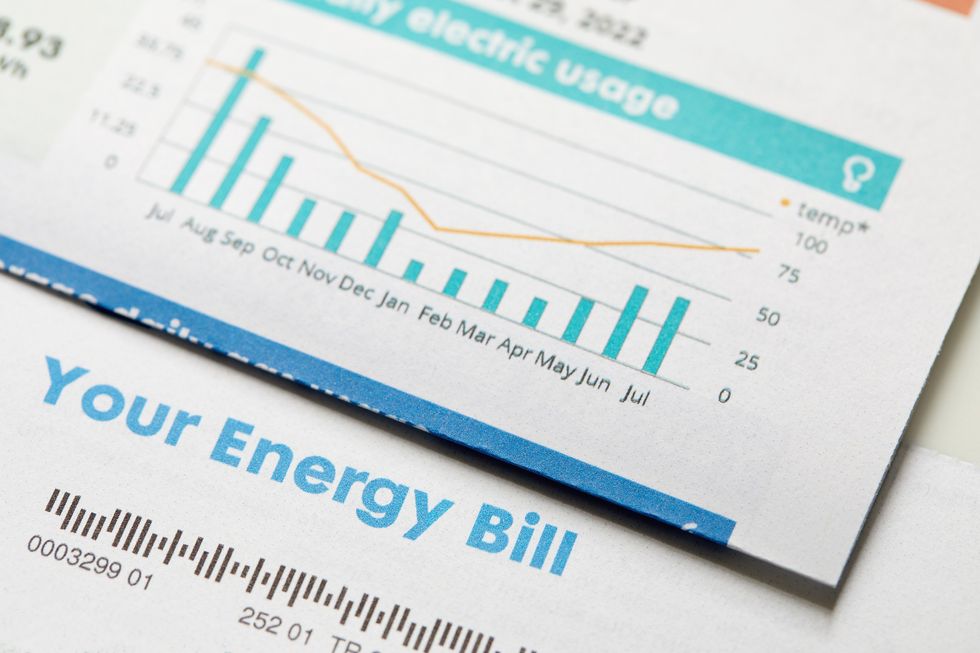Ofgem price cap update: Brits urged to take smart meter reading to avoid energy bill hike

Ofgem's energy price cap has jumped by 10 per cent as of today
|PA/GETTY

Energy bills will go up for the average household with this recent increase in the price cap
Don't Miss
Most Read
Millions of British households face higher energy bills as Ofgem raises its price cap by 10 per cent from today (October 1) and are being urged to take a smart meter reading as soon as possible to avoid skyrocketing costs
The average annual bill for a typical dual-fuel household in England, Scotland and Wales will increase by £149, rising from £1,568 to £1,717. This translates to approximately £12 more per month on average bills.
Ofgem, the energy regulator, attributes the hike primarily to rising prices in the international energy market, citing heightened political tensions and extreme weather events as key factors.
The new cap sets maximum prices for each kilowatt hour (kWh) of energy used, with households on standard variable tariffs paying an average of 24.5p per unit for electricity and 6.24p per unit for gas.
Nearly 10 million households have been warned they risk overpaying for energy if they fail to submit meter readings to their suppliers. This is particularly crucial for those on standard variable tariffs without smart meters.
Experts advise taking readings as soon as possible to ensure energy used before October 1 is not billed at the higher rates. Without accurate readings, suppliers base bills on estimated usage, potentially leading to overcharging.
Do you have a money story you’d like to share? Get in touch by emailing money@gbnews.uk.
 Ofgem's energy price cap hike is a blow to millions of households | GETTY
Ofgem's energy price cap hike is a blow to millions of households | GETTY Elise Melville, energy spokeswoman at Uswitch, said: "There are plenty of fixed energy tariffs that are cheaper than the October price cap and more are coming on to the market as competition increases."
Ofgem chief executive Jonathan Brearley urged consumers to shop around and consider fixed-rate tariffs that could save money. He added that Ofgem is collaborating with various stakeholders to support customers during this period.
The price cap increase coincides with reduced support for millions of pensioners. The new Government has scrapped winter fuel payments for those not receiving pension credits or other benefits, affecting approximately 10 million pensioners who will miss out on payments of up to £300 this year.
A survey by fuel poverty charity National Energy Action (NEA) and YouGov reveals that nearly half of British adults (46 per cent) are likely to ration their energy use this winter, using less than necessary for comfort and wellbeing.
NEA chief executive Adam Scorer said: "Millions of households face another dreadful winter, resigned to increasing energy debt or not heating their homes at all.
"We find ourselves stuck in a predictable loop of increasing prices and inadequate support."
Despite these challenges, the current price cap remains significantly lower than during the peak of the energy crisis following Russia's invasion of Ukraine in February 2022.
Despite the current price hike, experts offer a glimmer of hope for households. Forecasts suggest a 1 per cent fall in the price cap in January, with further decreases expected over the following two quarters.
However, concerns persist about the immediate impact on vulnerable groups.
Citizens Advice has expressed particular worry for households with children and young people, as well as those on lower incomes, who are most likely to struggle with heating costs.
LATEST DEVELOPMENTS:
 The cost of living crisis has pushed energy bills to new heights in recent years | GETTY
The cost of living crisis has pushed energy bills to new heights in recent years | GETTY Comparison site Uswitch.com has calculated that the average household on a standard variable tariff is expected to spend £135 on energy in October, compared with £55 in September.
This significant increase is due to a combination of higher rates and increased usage as autumn begins.
Experts continue to advise consumers to explore fixed-rate tariffs, which may offer savings compared to the current price cap.
With the long-term outlook for energy prices uncertain, experts advise consumers to consider locking in lower rates before winter. Fixed energy tariffs are emerging as a potentially cost-effective option for many households.









